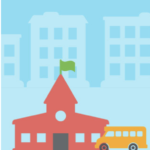I’m wrapping up my week as an Ask Me Anything Expert for the Cisco Insider Advocates. What an enjoyable experience! The topics we delved into were all about Hybrid Teaching and Learning for education networks. There were many facets to the conversation, and I thank the Advocates for their great questions and insightful thinking. I will admit that this was very enjoyable, and it made me miss the days when I taught at the collegiate level and used discussion forums within the learning management platform to teach concepts.
I would like to reiterate a few things that I address daily with Cisco customers. Three technology groups are vital to the hybrid environment:
- A sound network
- A secure environment
- A robust collaborative platform that allows for all the avenues of communication needed.
With these three as the platform, and any number of other software applications with open API’s, anything can be achieved.
What does it mean to have sound education networks?
The power of well-built education networks, with the ability to provide robust wireless to modern classrooms and learning spaces, is key to a learning institution. Sustainability is at the forefront as schools strive to reduce costs while not reducing programs and opportunities for learning.
The education network does so much more now, from linking security cameras and sensors, to providing room automation capabilities that can be connected to HVAC systems and even window shades. Thanks to the network, there is now so much more that can help start the conversation on how to be sustainable. As we move into the new era of education, it’s truly time to re-imagine, re-design, and re-form our models and spaces used for education.
The need for physical and cyber security is paramount
Our schools desperately need security both physical and cyber. Not a day goes by without a worry about the physical safety of our school campuses. It‘s time to use technology to enable these environments for greater safety. The need for a proactive approach on this topic is urgently being discussed, but I wonder if we are really taking enough action?
I hear from education leaders every day after a demo or strategic planning session that they just didn’t know what technologies are available. And, when it comes to the privacy of the data and personal information of staff and students, education organizations have the technology, but funding is the overall deterrent to acquiring and adopting the best solutions.
Finding the right communication platform for education networks
The final technology that I always discuss is the communication platform. A communication platform that can reach all the constituents of the school community by linking multiple social media platforms together is key as many schools struggle with the tasks needed to have separate solutions for each platform.
We must work smarter and procure a robust communication platform that includes calling, messaging, meetings, events/webinars, and a contact center. I’m talking about Webex. In education, Webex has been seen as an enterprise level meetings platform. But it’s so much more. It can reduce operating expenditures and help overcome staffing issues. It can directly address the digital communication needs of education institutions by providing easy to setup and use user translation, transcribing, polling, annotating, and breakout rooms. And it can be leveraged by your institution to create an engaging learning environment.
I would also be remiss if I did not mention the Webex Education Connector that connects the Webex platform to several of the most used Learning Management Systems. This integration allows effortless meetings, messaging, and calling capabilities within the course software.
Looking forward in education with AI
As we look to re-imagine and re-design learning we need to look at the capabilities of technologies to truly help teachers personalize the learning environment for each and every student.
Through artificial intelligence (AI), we can build platforms that will help teachers automatically cohort students into groups and allow teachers to be notified when students are ready for a learning moment. These moments can be remedial or “just in time” lessons to enable the learning process. Just imagine – high quality content delivered at the right time enabled by highly qualified teachers building the connections and the relationships to enhance the learning.
At one time we had one room schoolhouses. Now, I know we cannot go back to those times nor am I suggesting we do. But it is of value to ask the question — can we use technology to enable a similar concept for learning? Can we bring students together beyond the geographic walls of our schools to create cohorts or a class of students that are at the same place in their learning? If we can use logistics to procure a ride through an app or secure goods and services through applications, I would like to delve into the idea of using logistics, AI, to help us re-design and re-think our institutions of education.
Resources on education networks
Find out how you can make your education networks more sound, secure, and robust.
And explore the AR/VR experience at:
Interested in joining Cisco Insider Advocates, a Cisco customer-exclusive program? Head over to the community and say hello!


Great
I’d say this is true. We educators don’t really know what tech is out there that we can use, let alone how to set it up and effectively use it. Training on how to use it effectively is probably the biggest hurdle we have to deal with every day.